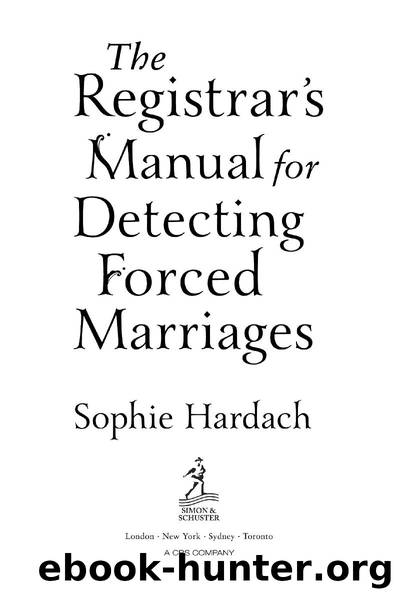The Registrar's Manual for Detecting Forced Marriages by Sophie Hardach

Author:Sophie Hardach [Hardach, Sophie]
Language: eng
Format: epub
ISBN: 9780857201201
Publisher: Simon and Schuster
29
In the shadow of Mount Ararat, where a trickle of water formed the source of the all-conquering Euphrates and Tigris Rivers, there lived a cluster of tribes whose arcane dialect, harsh customs and surprisingly joyful folklore had intrigued generations of writers and travellers.
For there is a Kurdish nation, although there has never been a Kurdish state, writes Jacques Tournesol, a Frenchman, in the foreword to The Kurds, a seminal tome on Kurdish culture published in 1932. Seminal not so much because of its insight or intellectual force, but because there were no competitors at the time. Théophile Leveque, a rival French anthropologist, obsessed with beating Tournesol to the presses, was working feverishly on the only other ethnography of the Kurds; but poor Leveque contracted syphilis during a stay in Constantinople in 1929, just before the city’s name was changed to Istanbul, and had to abandon the manuscript and relocate to a sanatorium in Switzerland, where, bitter, lonely and noseless, he watched Tournesol’s publishing success from afar as the disease gnawed away at his features.
Leveque was bewitched by the spiritual life of the Kurds, by the way their ancient Yezidi religion merged with newer Islamic beliefs, muddying the literal Quranic instructions and infusing them with an earthier, more sensual, more mystical view of God and his creatures. Persian-influenced poems and songs, peacock angels, holy fires and bloody codes of honour: that was how Leveque saw Kurdish culture. But because of Leveque’s syphilis-infested dalliance in Constantinople, no one was to discover his take on Kurdistan, and readers had to make do with Tournesol.
Tournesol did not dwell on Persian dialects and peacock angels. He was a man of science, with a fondness for psychoanalysis. As a student, he once travelled all the way to Vienna in the hope of meeting Freud. He spent an hour waiting outside Freud’s rooms before a secretary told him the great man was not in town. A persistent type, Tournesol pretended to leave while actually hiding in an adjacent room. And sure enough, ten minutes later, his eye on the keyhole, he spied someone bearded scurrying down the corridor. Hurt, Tournesol left Vienna that same night. Despite the slight, he could not bring himself to renounce psychoanalysis.
Never mind; now Tournesol himself was almost famous, only one ethnography away from academic glory. In his draughty little flat in Paris, he adjusted his fez (a souvenir brought back from his journeys through the Orient), threw another log onto the fire, and with a sigh picked up his pen. Ten pages before lunch, that was his target.
They pass the winter in the valley. Months of waiting, it seems, months of baking bread, sipping tea and telling folk tales; but really, underneath the hibernating calm, one can detect the most frantic and nervous activity: cloaks and bags are mended, lambs and babies are kept warm and fed with milk, so that the young ones grow quickly, become strong and healthy, and, when the spring comes, are prepared for the strenuous exodus into the mountains.
Download
This site does not store any files on its server. We only index and link to content provided by other sites. Please contact the content providers to delete copyright contents if any and email us, we'll remove relevant links or contents immediately.
Red by Erica Spindler(12575)
Crooked Kingdom: Book 2 (Six of Crows) by Bardugo Leigh(12319)
Twisted Palace by Erin Watt(11155)
Mindhunter: Inside the FBI's Elite Serial Crime Unit by John E. Douglas & Mark Olshaker(9344)
Fangirl by Rainbow Rowell(9252)
Never let me go by Kazuo Ishiguro(8902)
All the Light We Cannot See: A Novel by Anthony Doerr(8497)
A Man Called Ove: A Novel by Fredrik Backman(8437)
The Lover by Duras Marguerite(7903)
Confessions of an Ugly Stepsister by Gregory Maguire(7889)
Little Fires Everywhere by Celeste Ng(7201)
The Vegetarian by Han Kang(6303)
To All the Boys I've Loved Before by Jenny Han(5851)
The Shadow Of The Wind by Carlos Ruiz Zafón(5693)
On the Yard (New York Review Books Classics) by Braly Malcolm(5525)
Keepsake: True North #2 by Sarina Bowen(5414)
Dancing After Hours by Andre Dubus(5280)
Ken Follett - World without end by Ken Follett(4734)
The Perks of Being a Wallflower by Stephen Chbosky(4649)
